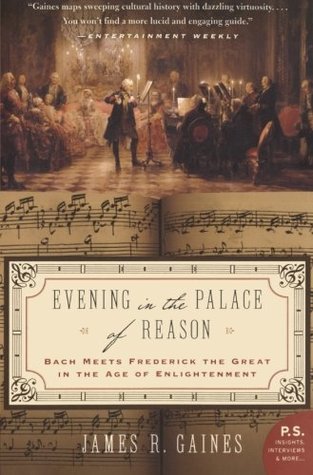Evening in the Palace of Reason by James R. Gaines
My rating: 5 of 5 stars
The book begins with the event referenced in the title, an invitation from Frederick the Great (1712-1786) to old Johann Sebastian Bach (1685-1750) to visit him with, on Frederick’s part, mostly the purpose of ridiculing the old man and his old notions of art. One of Bach’s several sons, Carl, was currently in Frederick’s employ. The event happened in 1747, three years before Bach’s death.
Then we are taken through a walk through each man’s life, with alternating chapters focusing on each man’s story. Much of the background helps us to see how they became the men that they did, some of it simply being the time in which they were born. Frederick is very much a man of the seemingly godless Enlightenment, loving the French ways more than Prussian, much to his own father’s consternation. Evidence is that Frederick was regularly emotionally and physically abused by his father. JS Bach, born 27 years before Frederick, was unashamed to acknowledge and glorify God in all his works. Bach believed in an ordered universe created by God, as well as order and rules in music coming from this ordered universe. One of the forms he often used was ‘Canon’, which has an original meaning of Law. All of this Frederick mocked, finding more appeal in the ‘galant’ style, which mostly had the purpose of entertaining and ‘tickling the fancies’ of the audience. Interestingly, Bach was such a genius that he not only reached into the past, but developed so many ideas that went past the life (and empire) of Frederick. Today who is Frederick ‘the Great’? but JS Bach we all know.
“After the war [WWII, in which Hitler had greatly used the image of Frederick] Frederick’s corpse was sent into the safekeeping of the last of the Hohenzollerns, who had withdrawn to a castle in one of the family’s former principalities. There he rested for half a century, until the post-reunification summer of 1991, when Chancellor Helmut Kohl created something of a stir by attending Frederick’s reinterment where he had always wished to be buried, next to his dogs at Sanssouci…..A poll conducted during the controversy over his reburial found that most Germans could not say when Frederick the Great had lived or what he had ever done.” (p. 268)
“The beauty of music, of course, what sets it apart from virtually every other human endeavor, is that it does not need the language of ideas; it requires no explanation and offers none, as much as it may say. Perhaps that is why music coming from a world where the invisible was palpable, where great cosmic forces played their part everywhere and every day, could so deeply move audiences so far from Bach’s time. Whether in the thrilling exuberance of his polyphonic Credo or in the single voice of an unaccompanied cello, in works extravagantly expressive and as intimate as a whisper, Bach’s music makes no argument that the world is more than a ticking clock, yet leaves no doubt of it.” (p. 273)
View all my reviews (on Goodreads)







